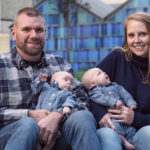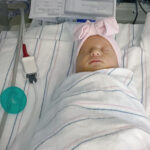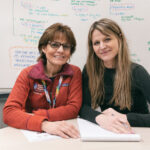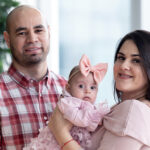My son is a NICU GraD: Here’s what I’ve learned
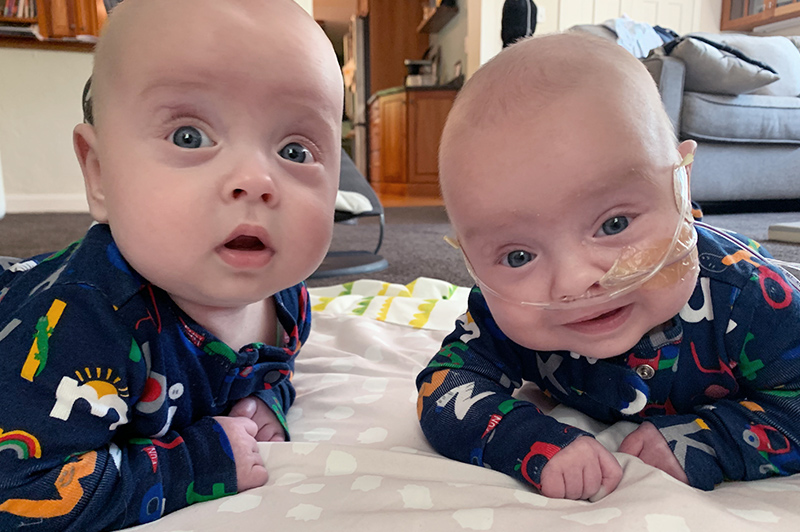
My husband and I aren’t first-time parents, but when our twins were born nine weeks early a year ago, everything we thought we knew went out the window.
The thing is, it wasn’t Cal and Theo’s early arrival that was the biggest shock; it was the challenges that came afterward. Life with newborns and a toddler at home is stressful, but when one child has extensive medical needs, it can be overwhelming. Navigating it requires constant attention, patience, and giving yourself grace. I can say this now because we’re lucky enough to be “on the other side,” but while we were living through it, we often felt in over our heads. That’s why we’re so grateful for the support we received and why I’m sharing what the experience has taught us.
1) Give time, time
The NICU Growth and Developmental Support (GraDS) Program provides ongoing medical and developmental support for infants discharged from Boston Children’s NICU, particularly those born prematurely or with complex health issues. It also cares for babies from the NICUs at Beth Israel Deaconess Medical Center and Brigham and Women’s Hospital, offering specialized evaluations and consultations to monitor and address both medical and developmental concerns.
Cal came home from the NICU close to his due date, but Theo’s journey was more complicated. During my pregnancy, we learned the boys were affected by twin-twin transfusion syndrome (TTTS), a condition where twins receive disproportionate blood flow from a shared placenta. Theo was the donor twin, meaning he received less blood. He also had selective fetal growth restriction, so he was smaller than Cal and faced chronic lung disease and feeding difficulties after he was born.
Once he was stable, Theo was transferred from the NICU at our birth hospital to a Special Care Nursery closer to home. He spent 109 days in the hospital. We heard repeatedly that his growth and recovery would “just take time,” but when you’re watching your baby have pauses in their breathing and work so hard to take a bottle, that reassurance can be hard to believe.
Our care teams reassured us that everything we were doing — the oxygen, NG tubes, and thickened feeds — was on track. They told us that we just needed to figure out what Theo needed, that these obstacles wouldn’t last forever, and that we would get through it. And we did.
2) Trust the process and your instincts
When Theo’s breathing difficulties didn’t resolve, he was transferred to Boston Children’s for a sleep study, which gave us a diagnosis of obstructive sleep apnea. It also brought us to the NICU, Dr. Paige Church, and the NICU GraDS Program, which turned out to be exactly what we needed and didn’t know existed.
After the sleep study, Theo was transferred back to the special care nursery and was eventually discharged, but he still needed oxygen and his feeding tube. Every day at home felt like a balancing act of getting him the nutrition he needed while respecting his limitations, but Dr. Church and the team provided daily consults and feedback that helped us understand his unique needs and adjust our approach accordingly. This was exactly the kind of support we needed after bringing home much of the same medical equipment Theo needed while he was in the NICU.
With Dr. Church’s guidance, we shifted our focus from increasing how much Theo was eating by mouth to making sure he was comfortable while eating and managing his reflux.
Through all the trials and errors of caring for Theo at home, Dr. Church listened to our concerns and empowered us to make decisions about the process. She was truly our partner.
3) Even the hardest moments end
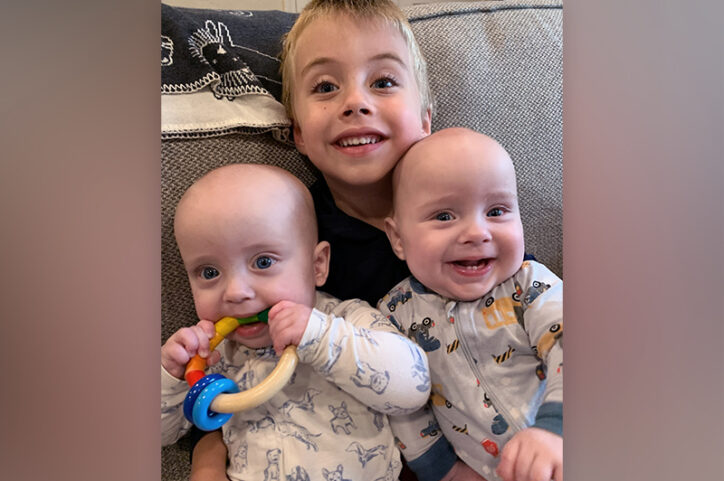
For what felt like an eternity, it was hard to envision a future without Theo’s feeding tube or oxygen equipment, despite everyone assuring us that day would come. Today, he’s thriving. He’s been off oxygen and his feeding tube since late summer and his weight gain is steady. He’s meeting all his milestones and doing everything Cal is doing — crawling, climbing, exploring, and playing with his big brother, Harrison.
For us, getting through the rough parts took time and the right support, expertise, and advocacy for our child. Those things made all the difference for our family. And they made all the difference for Theo.
Learn more about the NICU GraDS program.
Related Posts :
-

Finding comfort and answers for twin-twin transfusion syndrome: Shannon’s story
Shannon’s journey through a challenging pregnancy with TTTS (twin-twin transfusion syndrome) was, as she puts it, an emotional rollercoaster. ...
-

I’ve been there, too: What my baby’s tumor taught me as a NICU nurse
I had a toddler at home when I found out I was pregnant with my twins, Hannah and Sophie. Since ...
-

Female leadership in neonatology: The value of mentorship
While the majority of neonatologists are women, women make up a far smaller proportion of neonatologists in leadership positions. A ...
-

For Ana Sofia: How one mom found prenatal care for fetal pleural effusion
Alexandra is the first to admit she asks a lot of questions and needs to know details. “I’m curious ...


